NTT in Australia: Compliance, Treaties, and Legal Aspects of Business
VerifiedAdded on 2023/06/11
|9
|2598
|138
Report
AI Summary
This report provides a detailed analysis of the legal and regulatory frameworks governing Nippon Telegraph and Telephone's (NTT) operations in Australia. It identifies key legislative and regulatory requirements, including taxation policies, telecommunication acts, and non-discrimination obligations. The report also examines the impact of international treaties, conventions, and agreements, such as the Australia New Zealand Closer Economic Relations Trade Agreement (ANZCERTA) and the China Australia Free Trade Agreement (ChAFTA), on NTT's business in Australia. It highlights how these frameworks and agreements influence NTT's services, investments, and overall business strategies, enabling the company to expand its operations and improve service delivery while adhering to Australian legal standards. Desklib provides access to similar solved assignments and past papers for students.
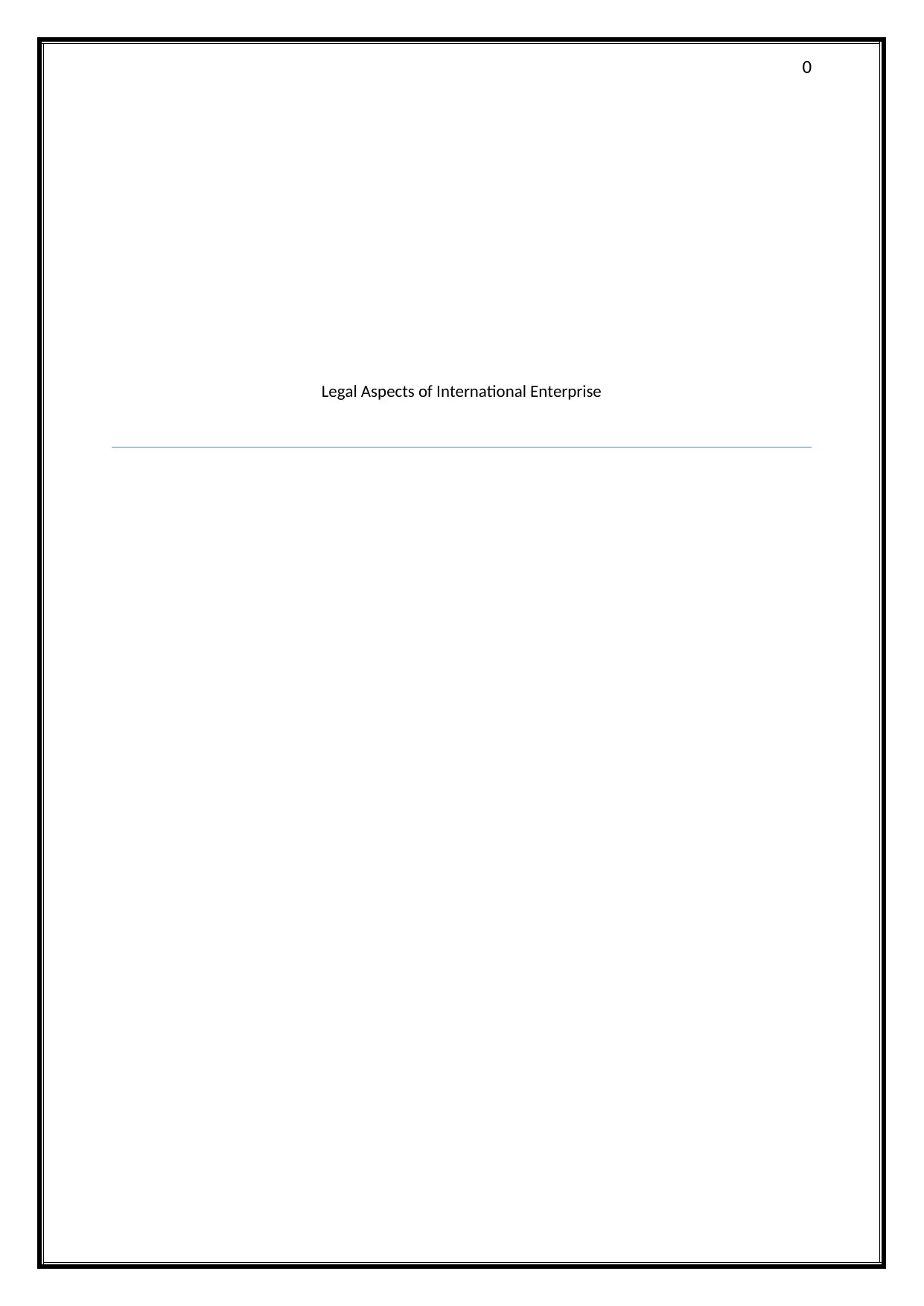
0
Legal Aspects of International Enterprise
Legal Aspects of International Enterprise
Paraphrase This Document
Need a fresh take? Get an instant paraphrase of this document with our AI Paraphraser
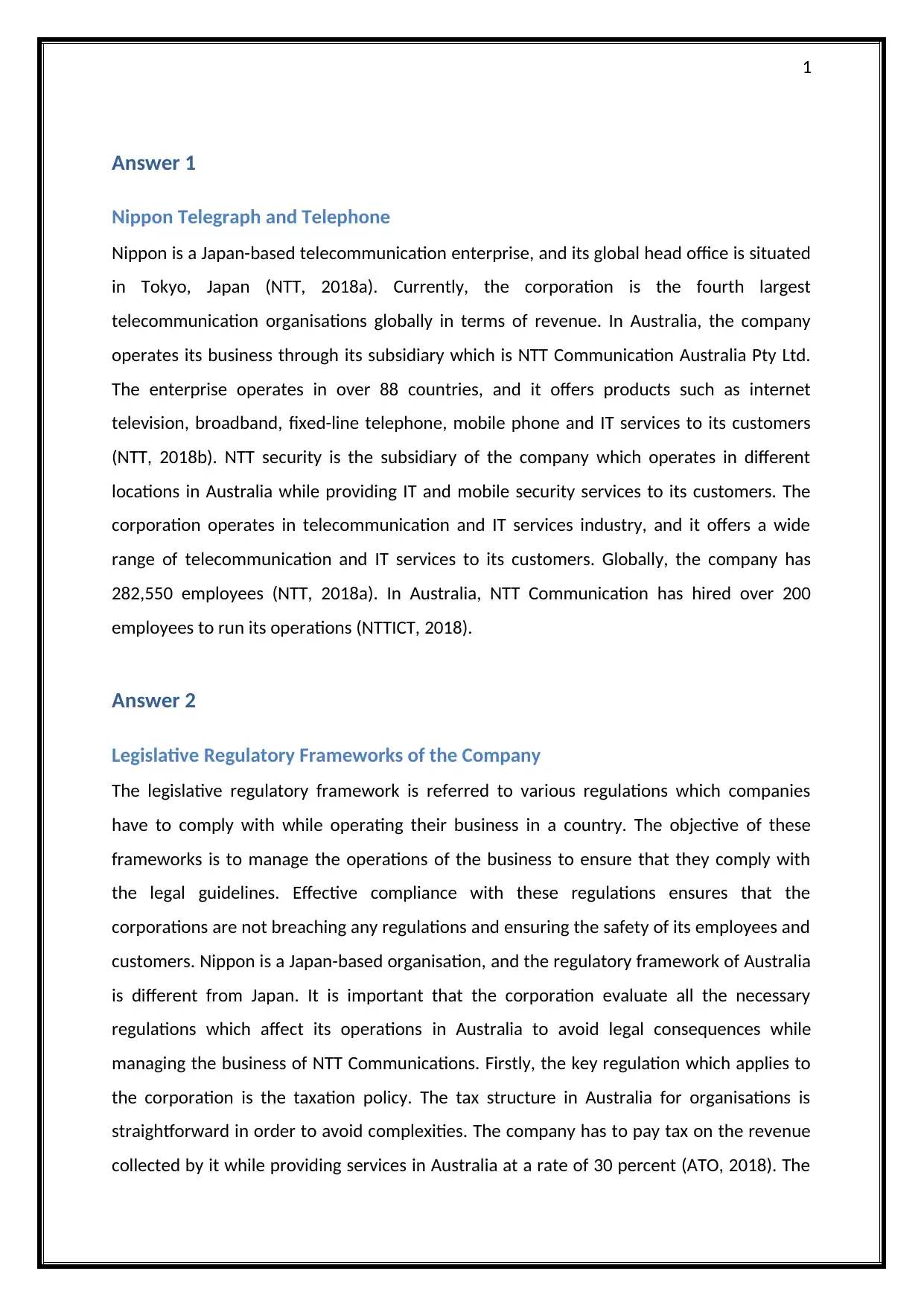
1
Answer 1
Nippon Telegraph and Telephone
Nippon is a Japan-based telecommunication enterprise, and its global head office is situated
in Tokyo, Japan (NTT, 2018a). Currently, the corporation is the fourth largest
telecommunication organisations globally in terms of revenue. In Australia, the company
operates its business through its subsidiary which is NTT Communication Australia Pty Ltd.
The enterprise operates in over 88 countries, and it offers products such as internet
television, broadband, fixed-line telephone, mobile phone and IT services to its customers
(NTT, 2018b). NTT security is the subsidiary of the company which operates in different
locations in Australia while providing IT and mobile security services to its customers. The
corporation operates in telecommunication and IT services industry, and it offers a wide
range of telecommunication and IT services to its customers. Globally, the company has
282,550 employees (NTT, 2018a). In Australia, NTT Communication has hired over 200
employees to run its operations (NTTICT, 2018).
Answer 2
Legislative Regulatory Frameworks of the Company
The legislative regulatory framework is referred to various regulations which companies
have to comply with while operating their business in a country. The objective of these
frameworks is to manage the operations of the business to ensure that they comply with
the legal guidelines. Effective compliance with these regulations ensures that the
corporations are not breaching any regulations and ensuring the safety of its employees and
customers. Nippon is a Japan-based organisation, and the regulatory framework of Australia
is different from Japan. It is important that the corporation evaluate all the necessary
regulations which affect its operations in Australia to avoid legal consequences while
managing the business of NTT Communications. Firstly, the key regulation which applies to
the corporation is the taxation policy. The tax structure in Australia for organisations is
straightforward in order to avoid complexities. The company has to pay tax on the revenue
collected by it while providing services in Australia at a rate of 30 percent (ATO, 2018). The
Answer 1
Nippon Telegraph and Telephone
Nippon is a Japan-based telecommunication enterprise, and its global head office is situated
in Tokyo, Japan (NTT, 2018a). Currently, the corporation is the fourth largest
telecommunication organisations globally in terms of revenue. In Australia, the company
operates its business through its subsidiary which is NTT Communication Australia Pty Ltd.
The enterprise operates in over 88 countries, and it offers products such as internet
television, broadband, fixed-line telephone, mobile phone and IT services to its customers
(NTT, 2018b). NTT security is the subsidiary of the company which operates in different
locations in Australia while providing IT and mobile security services to its customers. The
corporation operates in telecommunication and IT services industry, and it offers a wide
range of telecommunication and IT services to its customers. Globally, the company has
282,550 employees (NTT, 2018a). In Australia, NTT Communication has hired over 200
employees to run its operations (NTTICT, 2018).
Answer 2
Legislative Regulatory Frameworks of the Company
The legislative regulatory framework is referred to various regulations which companies
have to comply with while operating their business in a country. The objective of these
frameworks is to manage the operations of the business to ensure that they comply with
the legal guidelines. Effective compliance with these regulations ensures that the
corporations are not breaching any regulations and ensuring the safety of its employees and
customers. Nippon is a Japan-based organisation, and the regulatory framework of Australia
is different from Japan. It is important that the corporation evaluate all the necessary
regulations which affect its operations in Australia to avoid legal consequences while
managing the business of NTT Communications. Firstly, the key regulation which applies to
the corporation is the taxation policy. The tax structure in Australia for organisations is
straightforward in order to avoid complexities. The company has to pay tax on the revenue
collected by it while providing services in Australia at a rate of 30 percent (ATO, 2018). The
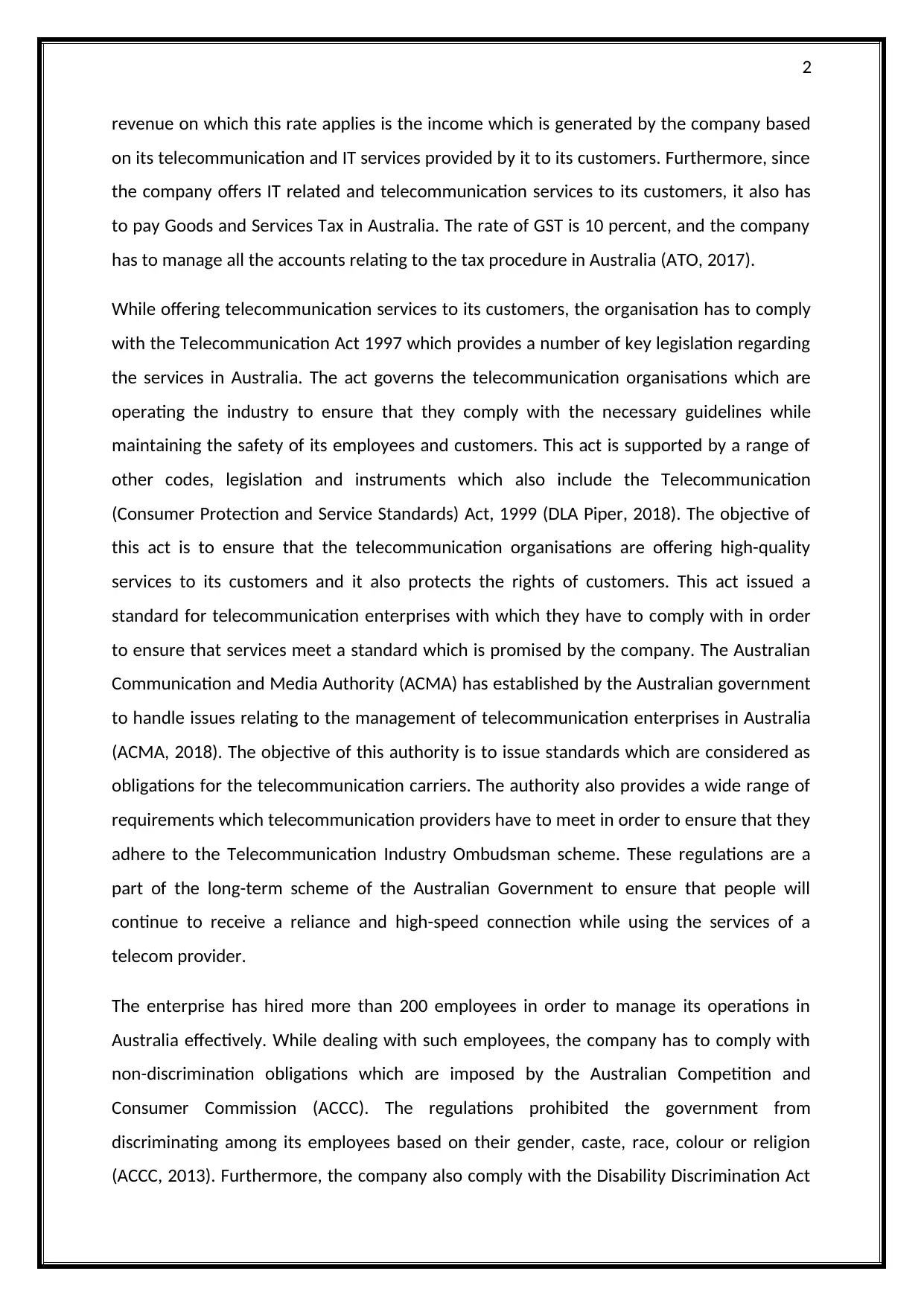
2
revenue on which this rate applies is the income which is generated by the company based
on its telecommunication and IT services provided by it to its customers. Furthermore, since
the company offers IT related and telecommunication services to its customers, it also has
to pay Goods and Services Tax in Australia. The rate of GST is 10 percent, and the company
has to manage all the accounts relating to the tax procedure in Australia (ATO, 2017).
While offering telecommunication services to its customers, the organisation has to comply
with the Telecommunication Act 1997 which provides a number of key legislation regarding
the services in Australia. The act governs the telecommunication organisations which are
operating the industry to ensure that they comply with the necessary guidelines while
maintaining the safety of its employees and customers. This act is supported by a range of
other codes, legislation and instruments which also include the Telecommunication
(Consumer Protection and Service Standards) Act, 1999 (DLA Piper, 2018). The objective of
this act is to ensure that the telecommunication organisations are offering high-quality
services to its customers and it also protects the rights of customers. This act issued a
standard for telecommunication enterprises with which they have to comply with in order
to ensure that services meet a standard which is promised by the company. The Australian
Communication and Media Authority (ACMA) has established by the Australian government
to handle issues relating to the management of telecommunication enterprises in Australia
(ACMA, 2018). The objective of this authority is to issue standards which are considered as
obligations for the telecommunication carriers. The authority also provides a wide range of
requirements which telecommunication providers have to meet in order to ensure that they
adhere to the Telecommunication Industry Ombudsman scheme. These regulations are a
part of the long-term scheme of the Australian Government to ensure that people will
continue to receive a reliance and high-speed connection while using the services of a
telecom provider.
The enterprise has hired more than 200 employees in order to manage its operations in
Australia effectively. While dealing with such employees, the company has to comply with
non-discrimination obligations which are imposed by the Australian Competition and
Consumer Commission (ACCC). The regulations prohibited the government from
discriminating among its employees based on their gender, caste, race, colour or religion
(ACCC, 2013). Furthermore, the company also comply with the Disability Discrimination Act
revenue on which this rate applies is the income which is generated by the company based
on its telecommunication and IT services provided by it to its customers. Furthermore, since
the company offers IT related and telecommunication services to its customers, it also has
to pay Goods and Services Tax in Australia. The rate of GST is 10 percent, and the company
has to manage all the accounts relating to the tax procedure in Australia (ATO, 2017).
While offering telecommunication services to its customers, the organisation has to comply
with the Telecommunication Act 1997 which provides a number of key legislation regarding
the services in Australia. The act governs the telecommunication organisations which are
operating the industry to ensure that they comply with the necessary guidelines while
maintaining the safety of its employees and customers. This act is supported by a range of
other codes, legislation and instruments which also include the Telecommunication
(Consumer Protection and Service Standards) Act, 1999 (DLA Piper, 2018). The objective of
this act is to ensure that the telecommunication organisations are offering high-quality
services to its customers and it also protects the rights of customers. This act issued a
standard for telecommunication enterprises with which they have to comply with in order
to ensure that services meet a standard which is promised by the company. The Australian
Communication and Media Authority (ACMA) has established by the Australian government
to handle issues relating to the management of telecommunication enterprises in Australia
(ACMA, 2018). The objective of this authority is to issue standards which are considered as
obligations for the telecommunication carriers. The authority also provides a wide range of
requirements which telecommunication providers have to meet in order to ensure that they
adhere to the Telecommunication Industry Ombudsman scheme. These regulations are a
part of the long-term scheme of the Australian Government to ensure that people will
continue to receive a reliance and high-speed connection while using the services of a
telecom provider.
The enterprise has hired more than 200 employees in order to manage its operations in
Australia effectively. While dealing with such employees, the company has to comply with
non-discrimination obligations which are imposed by the Australian Competition and
Consumer Commission (ACCC). The regulations prohibited the government from
discriminating among its employees based on their gender, caste, race, colour or religion
(ACCC, 2013). Furthermore, the company also comply with the Disability Discrimination Act
⊘ This is a preview!⊘
Do you want full access?
Subscribe today to unlock all pages.

Trusted by 1+ million students worldwide
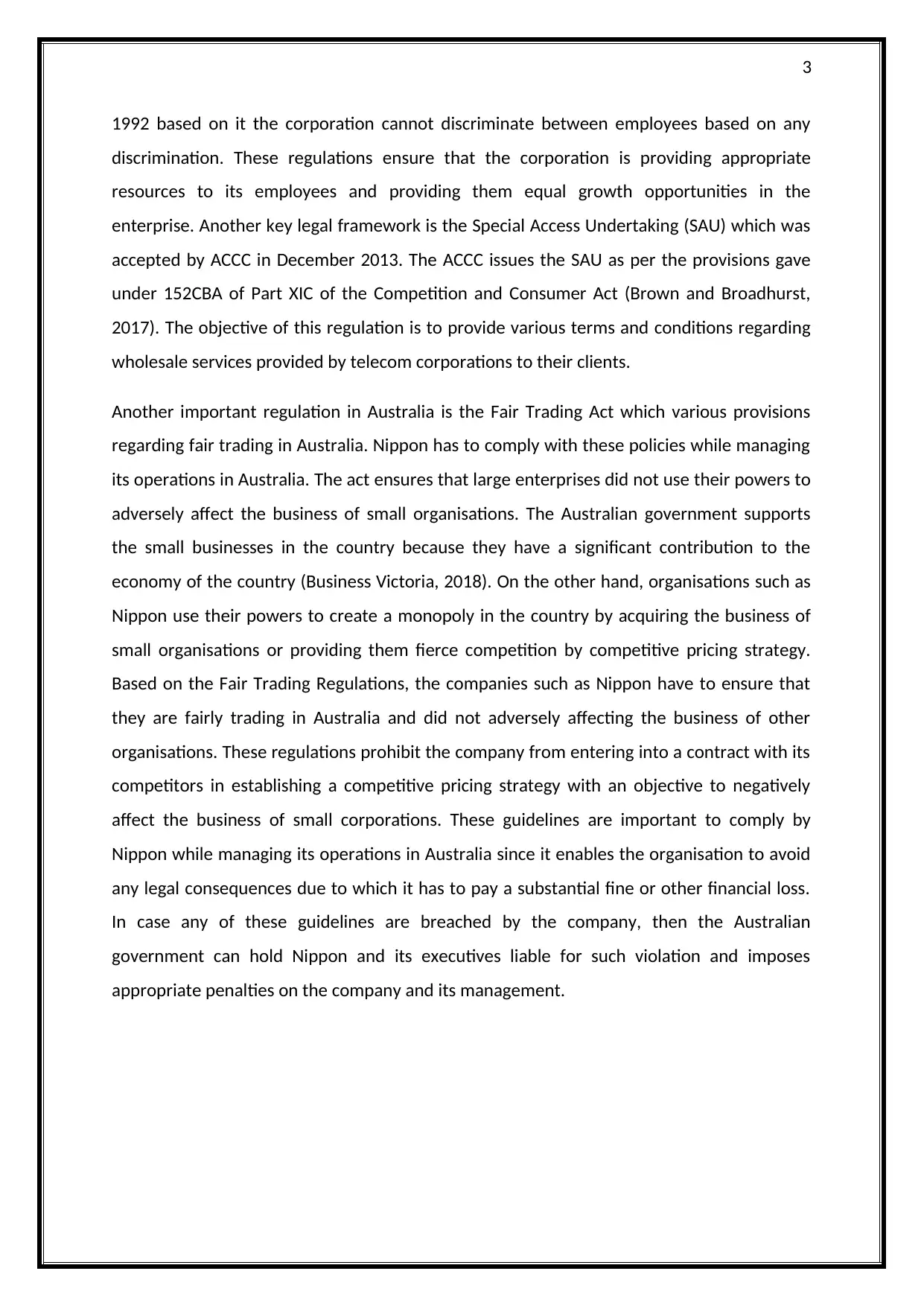
3
1992 based on it the corporation cannot discriminate between employees based on any
discrimination. These regulations ensure that the corporation is providing appropriate
resources to its employees and providing them equal growth opportunities in the
enterprise. Another key legal framework is the Special Access Undertaking (SAU) which was
accepted by ACCC in December 2013. The ACCC issues the SAU as per the provisions gave
under 152CBA of Part XIC of the Competition and Consumer Act (Brown and Broadhurst,
2017). The objective of this regulation is to provide various terms and conditions regarding
wholesale services provided by telecom corporations to their clients.
Another important regulation in Australia is the Fair Trading Act which various provisions
regarding fair trading in Australia. Nippon has to comply with these policies while managing
its operations in Australia. The act ensures that large enterprises did not use their powers to
adversely affect the business of small organisations. The Australian government supports
the small businesses in the country because they have a significant contribution to the
economy of the country (Business Victoria, 2018). On the other hand, organisations such as
Nippon use their powers to create a monopoly in the country by acquiring the business of
small organisations or providing them fierce competition by competitive pricing strategy.
Based on the Fair Trading Regulations, the companies such as Nippon have to ensure that
they are fairly trading in Australia and did not adversely affecting the business of other
organisations. These regulations prohibit the company from entering into a contract with its
competitors in establishing a competitive pricing strategy with an objective to negatively
affect the business of small corporations. These guidelines are important to comply by
Nippon while managing its operations in Australia since it enables the organisation to avoid
any legal consequences due to which it has to pay a substantial fine or other financial loss.
In case any of these guidelines are breached by the company, then the Australian
government can hold Nippon and its executives liable for such violation and imposes
appropriate penalties on the company and its management.
1992 based on it the corporation cannot discriminate between employees based on any
discrimination. These regulations ensure that the corporation is providing appropriate
resources to its employees and providing them equal growth opportunities in the
enterprise. Another key legal framework is the Special Access Undertaking (SAU) which was
accepted by ACCC in December 2013. The ACCC issues the SAU as per the provisions gave
under 152CBA of Part XIC of the Competition and Consumer Act (Brown and Broadhurst,
2017). The objective of this regulation is to provide various terms and conditions regarding
wholesale services provided by telecom corporations to their clients.
Another important regulation in Australia is the Fair Trading Act which various provisions
regarding fair trading in Australia. Nippon has to comply with these policies while managing
its operations in Australia. The act ensures that large enterprises did not use their powers to
adversely affect the business of small organisations. The Australian government supports
the small businesses in the country because they have a significant contribution to the
economy of the country (Business Victoria, 2018). On the other hand, organisations such as
Nippon use their powers to create a monopoly in the country by acquiring the business of
small organisations or providing them fierce competition by competitive pricing strategy.
Based on the Fair Trading Regulations, the companies such as Nippon have to ensure that
they are fairly trading in Australia and did not adversely affecting the business of other
organisations. These regulations prohibit the company from entering into a contract with its
competitors in establishing a competitive pricing strategy with an objective to negatively
affect the business of small corporations. These guidelines are important to comply by
Nippon while managing its operations in Australia since it enables the organisation to avoid
any legal consequences due to which it has to pay a substantial fine or other financial loss.
In case any of these guidelines are breached by the company, then the Australian
government can hold Nippon and its executives liable for such violation and imposes
appropriate penalties on the company and its management.
Paraphrase This Document
Need a fresh take? Get an instant paraphrase of this document with our AI Paraphraser
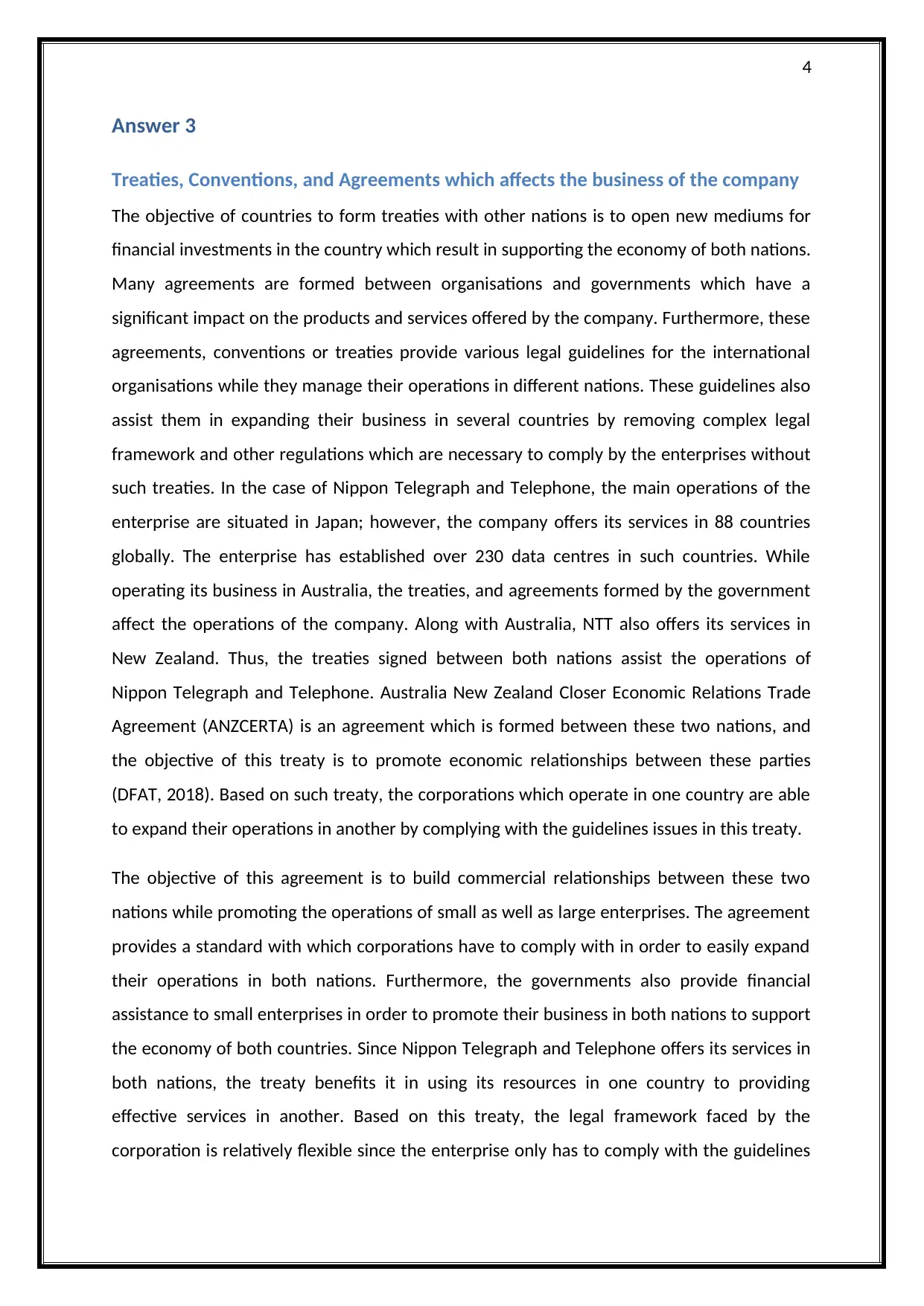
4
Answer 3
Treaties, Conventions, and Agreements which affects the business of the company
The objective of countries to form treaties with other nations is to open new mediums for
financial investments in the country which result in supporting the economy of both nations.
Many agreements are formed between organisations and governments which have a
significant impact on the products and services offered by the company. Furthermore, these
agreements, conventions or treaties provide various legal guidelines for the international
organisations while they manage their operations in different nations. These guidelines also
assist them in expanding their business in several countries by removing complex legal
framework and other regulations which are necessary to comply by the enterprises without
such treaties. In the case of Nippon Telegraph and Telephone, the main operations of the
enterprise are situated in Japan; however, the company offers its services in 88 countries
globally. The enterprise has established over 230 data centres in such countries. While
operating its business in Australia, the treaties, and agreements formed by the government
affect the operations of the company. Along with Australia, NTT also offers its services in
New Zealand. Thus, the treaties signed between both nations assist the operations of
Nippon Telegraph and Telephone. Australia New Zealand Closer Economic Relations Trade
Agreement (ANZCERTA) is an agreement which is formed between these two nations, and
the objective of this treaty is to promote economic relationships between these parties
(DFAT, 2018). Based on such treaty, the corporations which operate in one country are able
to expand their operations in another by complying with the guidelines issues in this treaty.
The objective of this agreement is to build commercial relationships between these two
nations while promoting the operations of small as well as large enterprises. The agreement
provides a standard with which corporations have to comply with in order to easily expand
their operations in both nations. Furthermore, the governments also provide financial
assistance to small enterprises in order to promote their business in both nations to support
the economy of both countries. Since Nippon Telegraph and Telephone offers its services in
both nations, the treaty benefits it in using its resources in one country to providing
effective services in another. Based on this treaty, the legal framework faced by the
corporation is relatively flexible since the enterprise only has to comply with the guidelines
Answer 3
Treaties, Conventions, and Agreements which affects the business of the company
The objective of countries to form treaties with other nations is to open new mediums for
financial investments in the country which result in supporting the economy of both nations.
Many agreements are formed between organisations and governments which have a
significant impact on the products and services offered by the company. Furthermore, these
agreements, conventions or treaties provide various legal guidelines for the international
organisations while they manage their operations in different nations. These guidelines also
assist them in expanding their business in several countries by removing complex legal
framework and other regulations which are necessary to comply by the enterprises without
such treaties. In the case of Nippon Telegraph and Telephone, the main operations of the
enterprise are situated in Japan; however, the company offers its services in 88 countries
globally. The enterprise has established over 230 data centres in such countries. While
operating its business in Australia, the treaties, and agreements formed by the government
affect the operations of the company. Along with Australia, NTT also offers its services in
New Zealand. Thus, the treaties signed between both nations assist the operations of
Nippon Telegraph and Telephone. Australia New Zealand Closer Economic Relations Trade
Agreement (ANZCERTA) is an agreement which is formed between these two nations, and
the objective of this treaty is to promote economic relationships between these parties
(DFAT, 2018). Based on such treaty, the corporations which operate in one country are able
to expand their operations in another by complying with the guidelines issues in this treaty.
The objective of this agreement is to build commercial relationships between these two
nations while promoting the operations of small as well as large enterprises. The agreement
provides a standard with which corporations have to comply with in order to easily expand
their operations in both nations. Furthermore, the governments also provide financial
assistance to small enterprises in order to promote their business in both nations to support
the economy of both countries. Since Nippon Telegraph and Telephone offers its services in
both nations, the treaty benefits it in using its resources in one country to providing
effective services in another. Based on this treaty, the legal framework faced by the
corporation is relatively flexible since the enterprise only has to comply with the guidelines
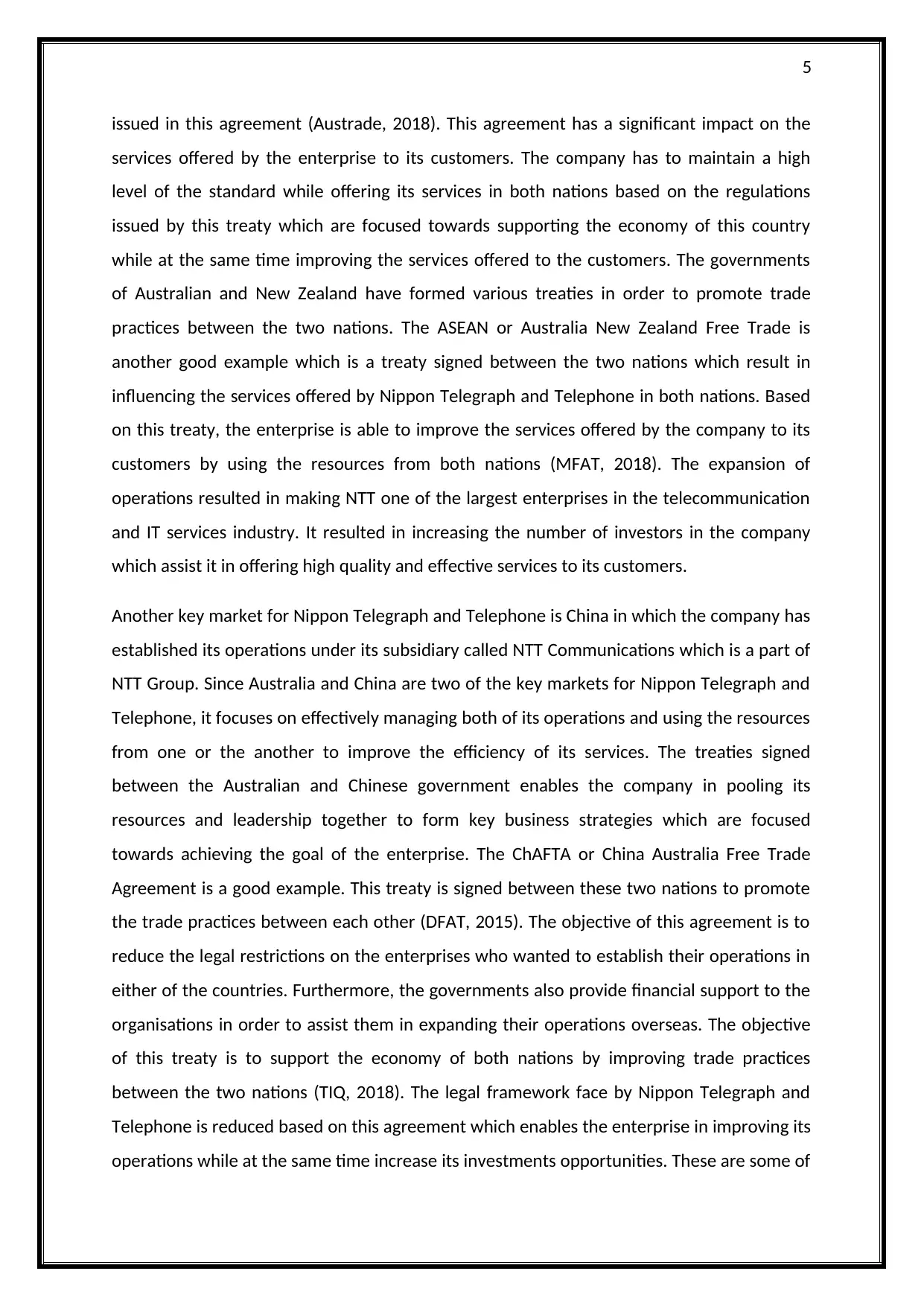
5
issued in this agreement (Austrade, 2018). This agreement has a significant impact on the
services offered by the enterprise to its customers. The company has to maintain a high
level of the standard while offering its services in both nations based on the regulations
issued by this treaty which are focused towards supporting the economy of this country
while at the same time improving the services offered to the customers. The governments
of Australian and New Zealand have formed various treaties in order to promote trade
practices between the two nations. The ASEAN or Australia New Zealand Free Trade is
another good example which is a treaty signed between the two nations which result in
influencing the services offered by Nippon Telegraph and Telephone in both nations. Based
on this treaty, the enterprise is able to improve the services offered by the company to its
customers by using the resources from both nations (MFAT, 2018). The expansion of
operations resulted in making NTT one of the largest enterprises in the telecommunication
and IT services industry. It resulted in increasing the number of investors in the company
which assist it in offering high quality and effective services to its customers.
Another key market for Nippon Telegraph and Telephone is China in which the company has
established its operations under its subsidiary called NTT Communications which is a part of
NTT Group. Since Australia and China are two of the key markets for Nippon Telegraph and
Telephone, it focuses on effectively managing both of its operations and using the resources
from one or the another to improve the efficiency of its services. The treaties signed
between the Australian and Chinese government enables the company in pooling its
resources and leadership together to form key business strategies which are focused
towards achieving the goal of the enterprise. The ChAFTA or China Australia Free Trade
Agreement is a good example. This treaty is signed between these two nations to promote
the trade practices between each other (DFAT, 2015). The objective of this agreement is to
reduce the legal restrictions on the enterprises who wanted to establish their operations in
either of the countries. Furthermore, the governments also provide financial support to the
organisations in order to assist them in expanding their operations overseas. The objective
of this treaty is to support the economy of both nations by improving trade practices
between the two nations (TIQ, 2018). The legal framework face by Nippon Telegraph and
Telephone is reduced based on this agreement which enables the enterprise in improving its
operations while at the same time increase its investments opportunities. These are some of
issued in this agreement (Austrade, 2018). This agreement has a significant impact on the
services offered by the enterprise to its customers. The company has to maintain a high
level of the standard while offering its services in both nations based on the regulations
issued by this treaty which are focused towards supporting the economy of this country
while at the same time improving the services offered to the customers. The governments
of Australian and New Zealand have formed various treaties in order to promote trade
practices between the two nations. The ASEAN or Australia New Zealand Free Trade is
another good example which is a treaty signed between the two nations which result in
influencing the services offered by Nippon Telegraph and Telephone in both nations. Based
on this treaty, the enterprise is able to improve the services offered by the company to its
customers by using the resources from both nations (MFAT, 2018). The expansion of
operations resulted in making NTT one of the largest enterprises in the telecommunication
and IT services industry. It resulted in increasing the number of investors in the company
which assist it in offering high quality and effective services to its customers.
Another key market for Nippon Telegraph and Telephone is China in which the company has
established its operations under its subsidiary called NTT Communications which is a part of
NTT Group. Since Australia and China are two of the key markets for Nippon Telegraph and
Telephone, it focuses on effectively managing both of its operations and using the resources
from one or the another to improve the efficiency of its services. The treaties signed
between the Australian and Chinese government enables the company in pooling its
resources and leadership together to form key business strategies which are focused
towards achieving the goal of the enterprise. The ChAFTA or China Australia Free Trade
Agreement is a good example. This treaty is signed between these two nations to promote
the trade practices between each other (DFAT, 2015). The objective of this agreement is to
reduce the legal restrictions on the enterprises who wanted to establish their operations in
either of the countries. Furthermore, the governments also provide financial support to the
organisations in order to assist them in expanding their operations overseas. The objective
of this treaty is to support the economy of both nations by improving trade practices
between the two nations (TIQ, 2018). The legal framework face by Nippon Telegraph and
Telephone is reduced based on this agreement which enables the enterprise in improving its
operations while at the same time increase its investments opportunities. These are some of
⊘ This is a preview!⊘
Do you want full access?
Subscribe today to unlock all pages.

Trusted by 1+ million students worldwide
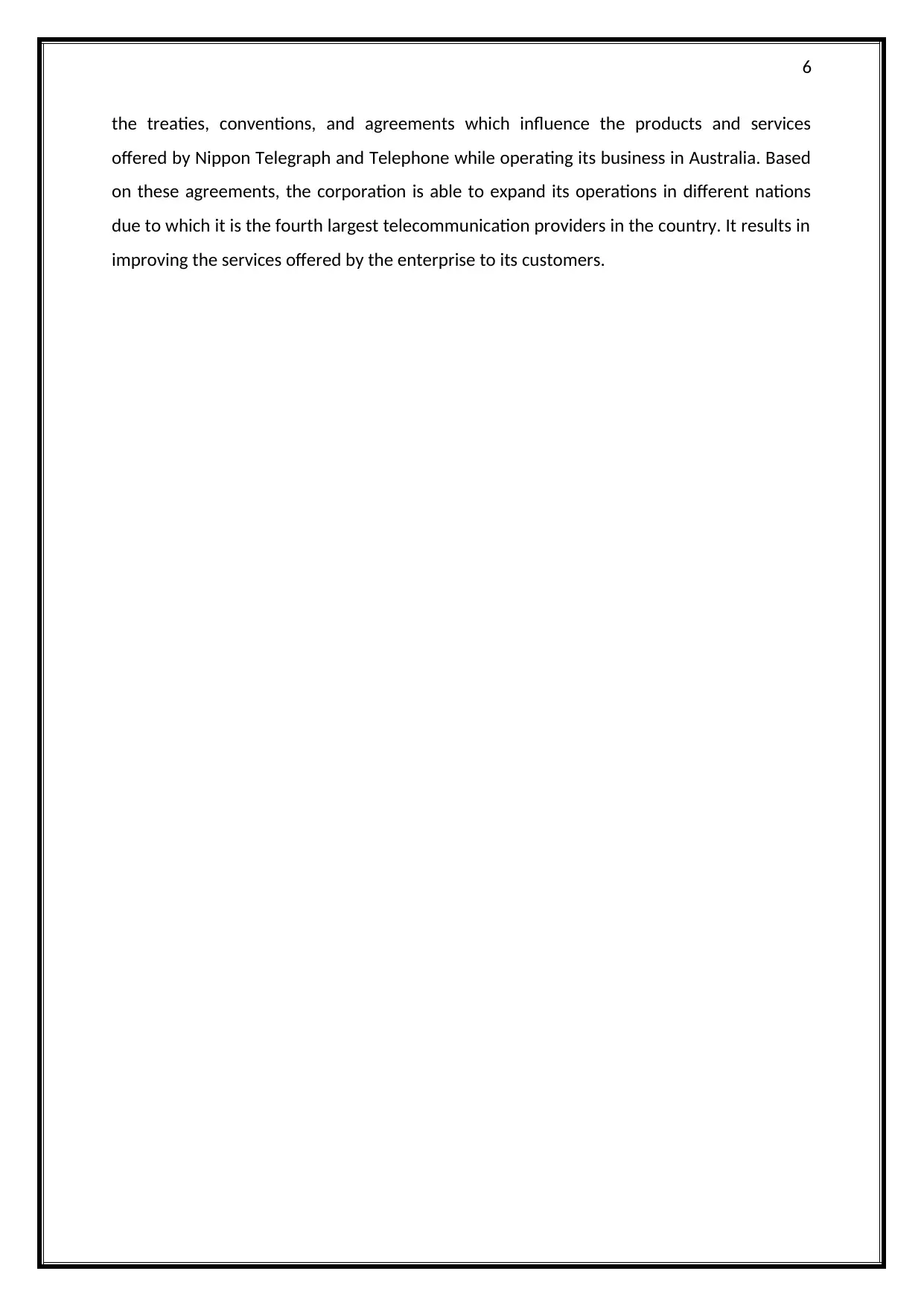
6
the treaties, conventions, and agreements which influence the products and services
offered by Nippon Telegraph and Telephone while operating its business in Australia. Based
on these agreements, the corporation is able to expand its operations in different nations
due to which it is the fourth largest telecommunication providers in the country. It results in
improving the services offered by the enterprise to its customers.
the treaties, conventions, and agreements which influence the products and services
offered by Nippon Telegraph and Telephone while operating its business in Australia. Based
on these agreements, the corporation is able to expand its operations in different nations
due to which it is the fourth largest telecommunication providers in the country. It results in
improving the services offered by the enterprise to its customers.
Paraphrase This Document
Need a fresh take? Get an instant paraphrase of this document with our AI Paraphraser
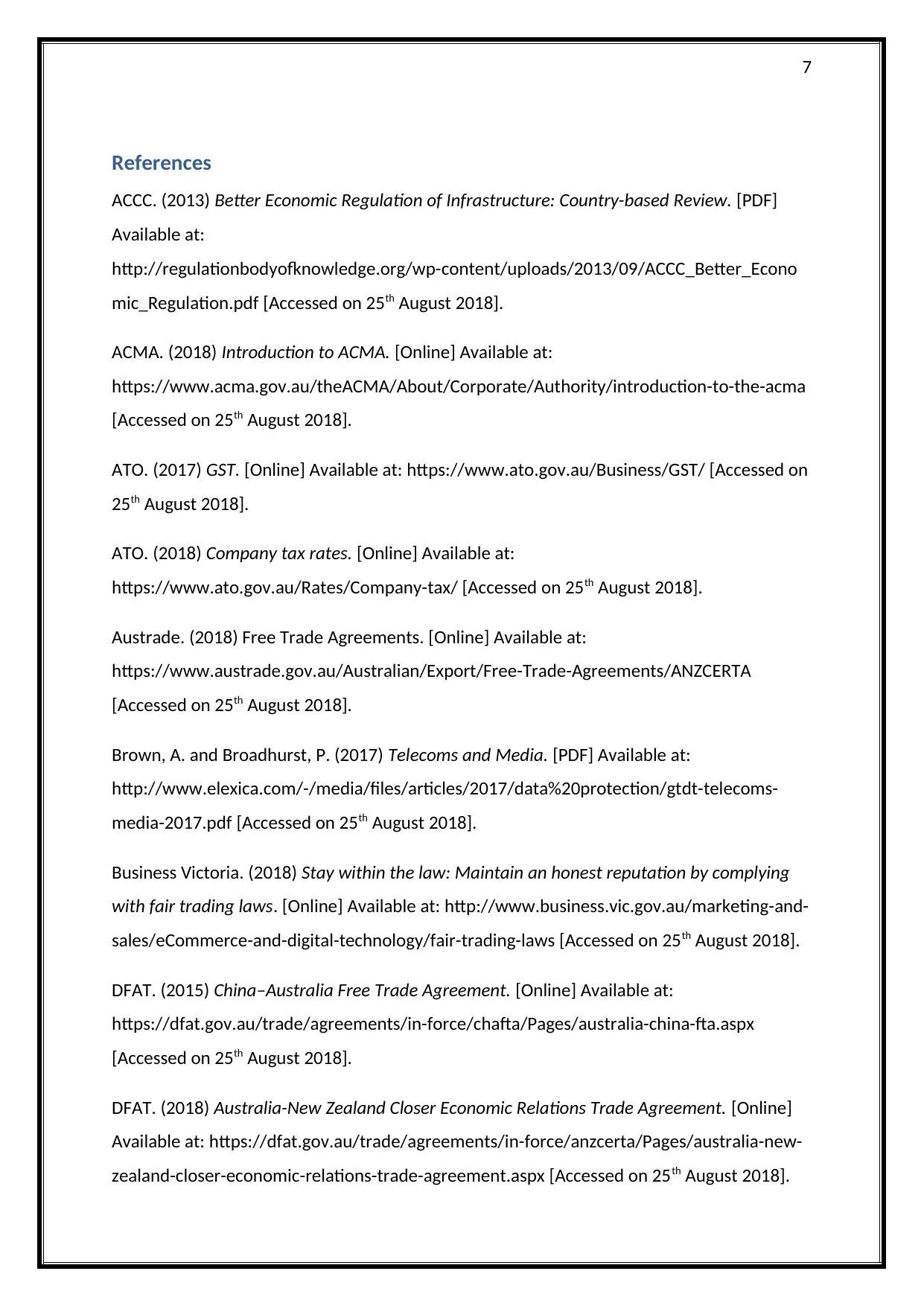
7
References
ACCC. (2013) Better Economic Regulation of Infrastructure: Country-based Review. [PDF]
Available at:
http://regulationbodyofknowledge.org/wp-content/uploads/2013/09/ACCC_Better_Econo
mic_Regulation.pdf [Accessed on 25th August 2018].
ACMA. (2018) Introduction to ACMA. [Online] Available at:
https://www.acma.gov.au/theACMA/About/Corporate/Authority/introduction-to-the-acma
[Accessed on 25th August 2018].
ATO. (2017) GST. [Online] Available at: https://www.ato.gov.au/Business/GST/ [Accessed on
25th August 2018].
ATO. (2018) Company tax rates. [Online] Available at:
https://www.ato.gov.au/Rates/Company-tax/ [Accessed on 25th August 2018].
Austrade. (2018) Free Trade Agreements. [Online] Available at:
https://www.austrade.gov.au/Australian/Export/Free-Trade-Agreements/ANZCERTA
[Accessed on 25th August 2018].
Brown, A. and Broadhurst, P. (2017) Telecoms and Media. [PDF] Available at:
http://www.elexica.com/-/media/files/articles/2017/data%20protection/gtdt-telecoms-
media-2017.pdf [Accessed on 25th August 2018].
Business Victoria. (2018) Stay within the law: Maintain an honest reputation by complying
with fair trading laws. [Online] Available at: http://www.business.vic.gov.au/marketing-and-
sales/eCommerce-and-digital-technology/fair-trading-laws [Accessed on 25th August 2018].
DFAT. (2015) China–Australia Free Trade Agreement. [Online] Available at:
https://dfat.gov.au/trade/agreements/in-force/chafta/Pages/australia-china-fta.aspx
[Accessed on 25th August 2018].
DFAT. (2018) Australia-New Zealand Closer Economic Relations Trade Agreement. [Online]
Available at: https://dfat.gov.au/trade/agreements/in-force/anzcerta/Pages/australia-new-
zealand-closer-economic-relations-trade-agreement.aspx [Accessed on 25th August 2018].
References
ACCC. (2013) Better Economic Regulation of Infrastructure: Country-based Review. [PDF]
Available at:
http://regulationbodyofknowledge.org/wp-content/uploads/2013/09/ACCC_Better_Econo
mic_Regulation.pdf [Accessed on 25th August 2018].
ACMA. (2018) Introduction to ACMA. [Online] Available at:
https://www.acma.gov.au/theACMA/About/Corporate/Authority/introduction-to-the-acma
[Accessed on 25th August 2018].
ATO. (2017) GST. [Online] Available at: https://www.ato.gov.au/Business/GST/ [Accessed on
25th August 2018].
ATO. (2018) Company tax rates. [Online] Available at:
https://www.ato.gov.au/Rates/Company-tax/ [Accessed on 25th August 2018].
Austrade. (2018) Free Trade Agreements. [Online] Available at:
https://www.austrade.gov.au/Australian/Export/Free-Trade-Agreements/ANZCERTA
[Accessed on 25th August 2018].
Brown, A. and Broadhurst, P. (2017) Telecoms and Media. [PDF] Available at:
http://www.elexica.com/-/media/files/articles/2017/data%20protection/gtdt-telecoms-
media-2017.pdf [Accessed on 25th August 2018].
Business Victoria. (2018) Stay within the law: Maintain an honest reputation by complying
with fair trading laws. [Online] Available at: http://www.business.vic.gov.au/marketing-and-
sales/eCommerce-and-digital-technology/fair-trading-laws [Accessed on 25th August 2018].
DFAT. (2015) China–Australia Free Trade Agreement. [Online] Available at:
https://dfat.gov.au/trade/agreements/in-force/chafta/Pages/australia-china-fta.aspx
[Accessed on 25th August 2018].
DFAT. (2018) Australia-New Zealand Closer Economic Relations Trade Agreement. [Online]
Available at: https://dfat.gov.au/trade/agreements/in-force/anzcerta/Pages/australia-new-
zealand-closer-economic-relations-trade-agreement.aspx [Accessed on 25th August 2018].
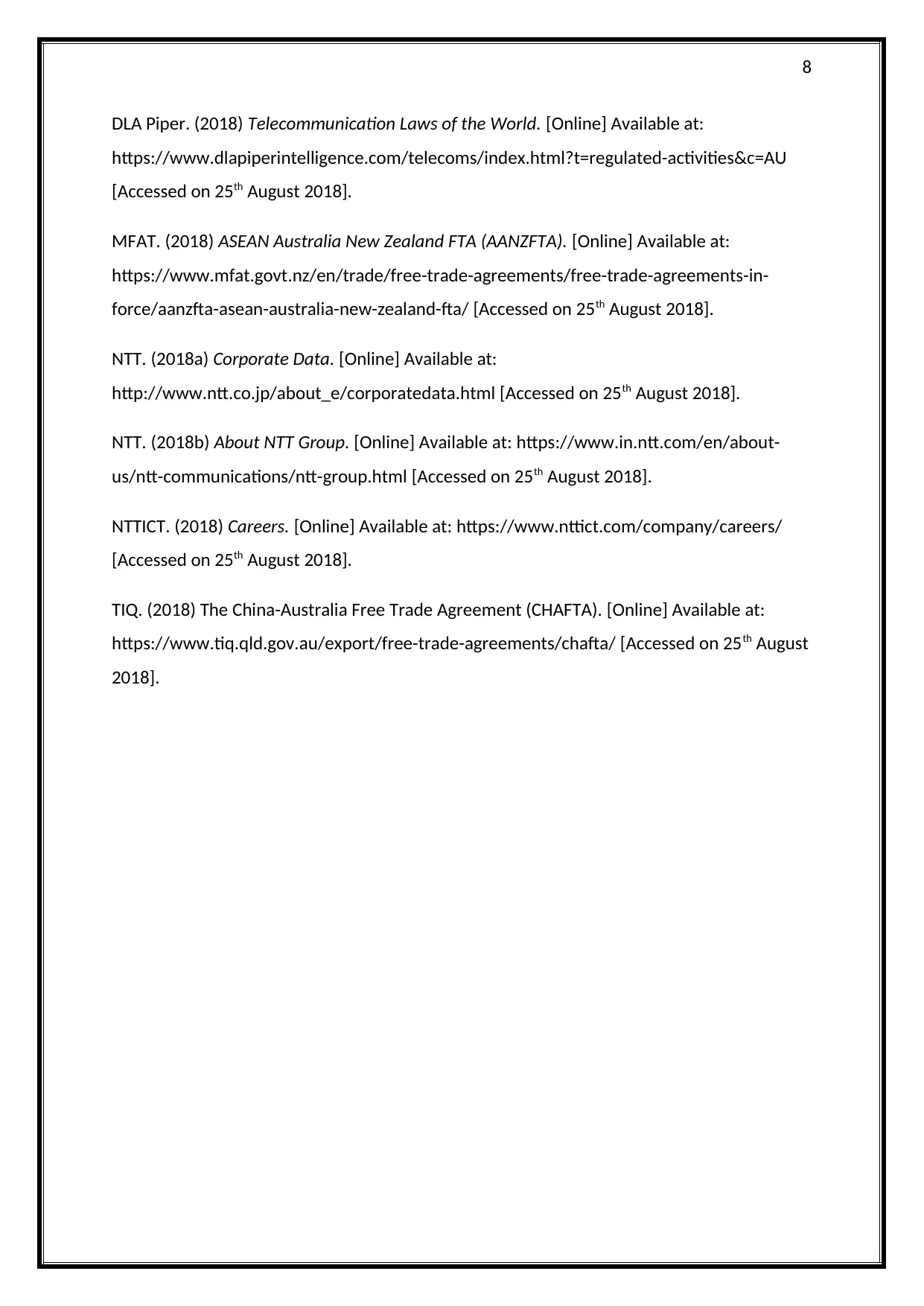
8
DLA Piper. (2018) Telecommunication Laws of the World. [Online] Available at:
https://www.dlapiperintelligence.com/telecoms/index.html?t=regulated-activities&c=AU
[Accessed on 25th August 2018].
MFAT. (2018) ASEAN Australia New Zealand FTA (AANZFTA). [Online] Available at:
https://www.mfat.govt.nz/en/trade/free-trade-agreements/free-trade-agreements-in-
force/aanzfta-asean-australia-new-zealand-fta/ [Accessed on 25th August 2018].
NTT. (2018a) Corporate Data. [Online] Available at:
http://www.ntt.co.jp/about_e/corporatedata.html [Accessed on 25th August 2018].
NTT. (2018b) About NTT Group. [Online] Available at: https://www.in.ntt.com/en/about-
us/ntt-communications/ntt-group.html [Accessed on 25th August 2018].
NTTICT. (2018) Careers. [Online] Available at: https://www.nttict.com/company/careers/
[Accessed on 25th August 2018].
TIQ. (2018) The China-Australia Free Trade Agreement (CHAFTA). [Online] Available at:
https://www.tiq.qld.gov.au/export/free-trade-agreements/chafta/ [Accessed on 25th August
2018].
DLA Piper. (2018) Telecommunication Laws of the World. [Online] Available at:
https://www.dlapiperintelligence.com/telecoms/index.html?t=regulated-activities&c=AU
[Accessed on 25th August 2018].
MFAT. (2018) ASEAN Australia New Zealand FTA (AANZFTA). [Online] Available at:
https://www.mfat.govt.nz/en/trade/free-trade-agreements/free-trade-agreements-in-
force/aanzfta-asean-australia-new-zealand-fta/ [Accessed on 25th August 2018].
NTT. (2018a) Corporate Data. [Online] Available at:
http://www.ntt.co.jp/about_e/corporatedata.html [Accessed on 25th August 2018].
NTT. (2018b) About NTT Group. [Online] Available at: https://www.in.ntt.com/en/about-
us/ntt-communications/ntt-group.html [Accessed on 25th August 2018].
NTTICT. (2018) Careers. [Online] Available at: https://www.nttict.com/company/careers/
[Accessed on 25th August 2018].
TIQ. (2018) The China-Australia Free Trade Agreement (CHAFTA). [Online] Available at:
https://www.tiq.qld.gov.au/export/free-trade-agreements/chafta/ [Accessed on 25th August
2018].
⊘ This is a preview!⊘
Do you want full access?
Subscribe today to unlock all pages.

Trusted by 1+ million students worldwide
1 out of 9
Related Documents
Your All-in-One AI-Powered Toolkit for Academic Success.
+13062052269
info@desklib.com
Available 24*7 on WhatsApp / Email
![[object Object]](/_next/static/media/star-bottom.7253800d.svg)
Unlock your academic potential
Copyright © 2020–2026 A2Z Services. All Rights Reserved. Developed and managed by ZUCOL.




